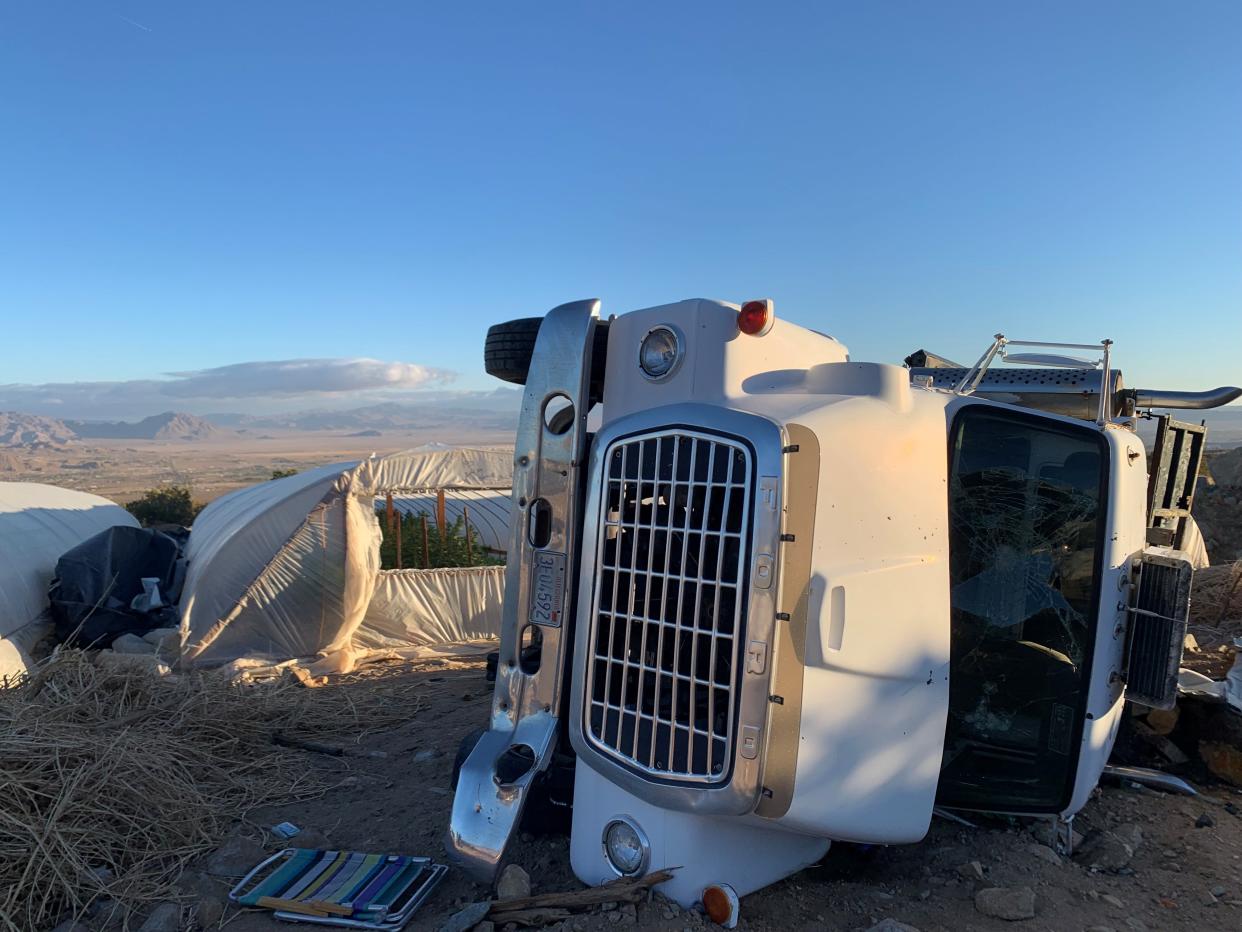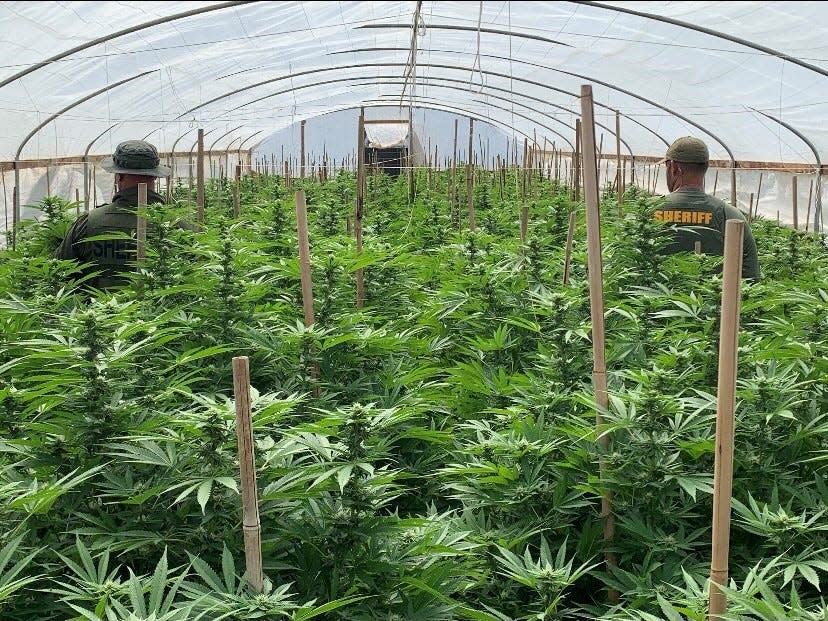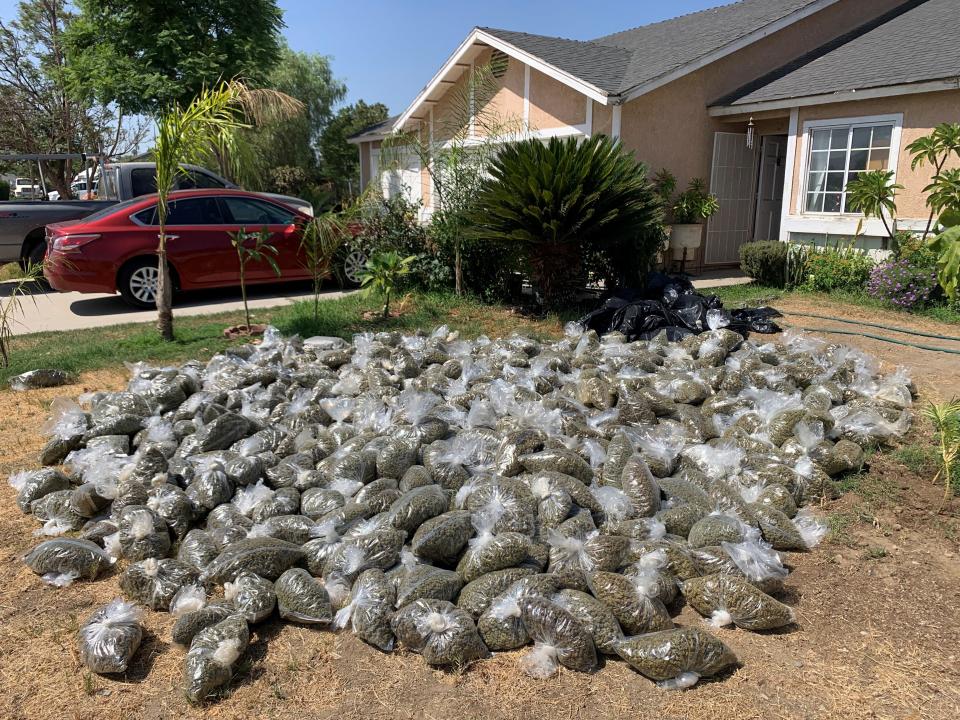Analysis: Sheriff arrests 326; nabs drugs, guns in 11 weeks of pot-farm raids

Specialized sheriff’s agents have seized black-market goods worth hundreds of millions of dollars and arrested 326 people — some foreign residents or allegedly tied to international “trafficking organizations” — in pot-farm raids across San Bernardino County.
Sheriff Shannon Dicus launched Operation Hammer Strike on Aug. 30 under pressure from rural residents in sparsely-populated and relatively undeveloped High Desert communities.
Longtime locals say the presence of these farms has turbocharged near their homes in recent years, bringing an escalation of water theft, environmental degradation, and public-safety threats that were already hitting hard in the region long before the ongoing surge.
Hammer Strike has produced a plethora of arrests and seizures in less than three months that suggest an international presence is helping fuel Southern California’s underground economy, according to a Daily Press analysis of sheriff’s department disclosures.
The Sheriff’s Department has seized at least 83 guns and nearly $800,000 in illicit cash, destroyed about 1,500 illegally-operated greenhouses, and knocked off 15 different illegal contraptions that were stealing electricity from various areas of the High Desert.
Yet, the sheer quantity of illicit drugs nabbed by officers in these raids dwarfs all of those numbers in scale.
To a degree, the black-market value of Hammer Strike seizures made by the Sheriff’s Department is incalculable. The sheriff’s special Marijuana Enforcement Teams have seized a combined total of nearly 55,000 pounds of processed cannabis from illegal grows, along with more than 260,000 raw cannabis plants.
Based on estimates from sources familiar with the black market, one pound of pot “on the street” ranges anywhere from $1,000 to $4,000 in the U.S. based on factors like quality and sourcing.
Using those metrics, Hammer Strike has seized a minimum of $54.8 million and a maximum of $219 million of processed weed after less than three months.
Separately, the raw plants seized by Hammer Strike officers could produce more than $1 billion in additional value on their own. One cannabis plant can produce just a couple of grams of pot or an entire pound on its own, depending on the equipment and commitment applied by a pot-grower.

An international criminal operation
With that, some people arrested in connection with these grows are residents of areas far from the operation itself. Outside of California, the most frequent place of residency among all 326 Hammer Strike arrestees thus far is Mexico. In total, 35 residents of Mexico have been arrested in Hammer Strike raids thus far.
At least one other non-U.S. resident has also been nabbed: Kham Phomthisene, a 61-year-old resident of the Southeast Asian country of Laos.
A variety of U.S. states outside California are home to other Hammer Strike arrestees.
Seven people who reside in Texas have been caught at High Desert grows thus far, six of them from Houston and a seventh from Fort Worth. Other non-Californians arrested in these raids include six Wisconsin residents — four from Milwaukee, two from Madison — and five New Yorkers, three of whom hail from Brooklyn and the other two from Flushing and Oakland Groves.
Hammer Strike data shows that black-market activity in San Bernardino County extends far beyond the “cannabis cultivation” crime that most arrestees are being cited for. However, an “arrest” in this case does not mean someone was put into cuffs and booked into jail due to a cannabis-farm raid.
Growing pot is a misdemeanor in California regardless of scale, be it a farm of six or 600 plants. This marks a level of decriminalization unmatched by other U.S. states that have legalized pot to some degree, all of which have maintained a felony status for large-scale illegal growers.
As of Nov. 14, the end of Hammer Strike’s 11th week in action, sheriff’s officers had produced more than 270 search warrants for illegal cannabis cultivation in and around the High Desert. They logged arrests at nearly 140 of those locations, ranging from compact indoor grows to industrial-scale operations.
Hammer Strike has also nabbed at least a few people on suspicions entirely separate from cannabis. A raid within a gated community in Rancho Cucamonga on Nov. 4 led officers to arrest two men — 48-year-old Jun Hou and 74-year-old Yingsheng Hou — on suspected charges of severe child abuse and electricity theft, the Daily Press previously reported.
Among the seven guns seized by Hammer Strike officers in their fourth week of raids, one was a handgun that “had the serial number ground off,” the sheriff disclosed at the time.
Another gun seized earlier this month had an “obliterated serial number” of its own. This makes it impossible for law enforcement to re-trace crucial details about a gun, like its last listed owner and the location where they bought it, without extensive forensic work.

Legal consequences are rare
Sheriff’s spokesperson Gloria Huerta told the Daily Press that “very few” of these arrestees have been booked into jail. Instead, they have gotten citations and been released on the spot.
California’s Proposition 64, which took effect in January 2018 after passing in a 2016 ballot referendum, is what many High Desert locals, law-enforcement officials, and Republican representatives say has allowed for an unfair and dangerous level of leniency in these cases.
Prop 64 lowered California’s penalty for illegal cultivation of six or more cannabis plants to a degree no other decriminalized U.S. state has matched.
Previously a felony in all cases, illegal cultivation is now a misdemeanor in California that carries up to six months in jail and up to $500 in fines for most adults — though it still is a felony in some cases, including for repeat offenders, people with violent felonies on their record and growers who violate state environmental laws.
Speaking to the out-of-state and foreign residents found at various cannabis-grows that Hammer Strike officers have raided, Sheriff’s Lt. Marc Bracco told the Daily Press that “most of our arrests are of Mexican national or Asian national.”
Bracco said “the criminal element” of international crime groups “enjoy huge financial gains” running illegal pot farms in California because they risk no more than a $500 fine if caught by police. “These types of drug trafficking organizations have low overhead at outdoor cultivation sites and there’s no risk to them having the grow locations within (San Bernardino County) due to our state regulations.”
“Another factor is the interstate freeways we have in our county,” Bracco added.
The lieutenant cited interstates 10, 15, and 40 as “commonly used highways to move illegal narcotics out of our state, and moving the illegal narcotics that come in from the Mexico Border.”

High Desert frustration
Frustrations over the surge in black-market cannabis grows has brewed most palpably among residents of rural, unincorporated areas in the High Desert who say the farms are hitting them hardest.
If the data on Hammer Strike arrests is any indication, they are correct.
More than three-quarters of the arrests disclosed by the Sheriff’s Department have occurred at illegal grows in unincorporated High Desert alcoves such as Phelan (48 arrests), Lucerne Valley (45), Newberry Springs (44), Pinon Hills (43), Hinkley (24) and Wonder Valley (17).
Some residents in these areas say they can see — and smell — operations of this kind from the porch of their home. Others tell more intense tales, including multiple residents at public meetings in recent months who allege gunshots have been fired at them from the desert while they were driving on remote stretches of road at night.
In sparsely-developed Lucerne Valley, some are worried about their sensitive water supplies further dwindling and new contaminants infusing their soil and air.
Personal anecdotes of engaging with what they say were illegal cannabis cultivators in and around their desert community are also common.
Speaking at the Lucerne Valley Economic Development Association’s monthly meeting in September, one local man said a group of growers loads water into vans from a business near him on so frequent a basis that he has learned what times and days to watch for them.
Another man told Sheriff’s Det. Alex Pangburn at the meeting that the trend is making the community’s roads more dangerous for drivers and pedestrians.
“What’s happening out here is a virus,” he said. “They’re popping up faster than you guys can control.”
Charlie McGee covers the city of Barstow and its surrounding communities for the Daily Press. He is also a Report for America corps member with the GroundTruth Project, an independent, nonpartisan, nonprofit news organization dedicated to supporting the next generation of journalists in the U.S. and around the world. McGee may be reached at 760-955-5341 or cmcgee@gannett.com. Follow him on Twitter @bycharliemcgee.
This article originally appeared on Victorville Daily Press: Sheriff seizes drugs, guns in pot farm raids in San Bernardino County

